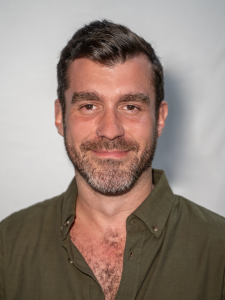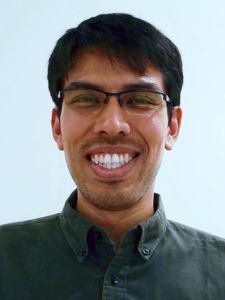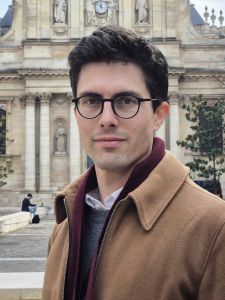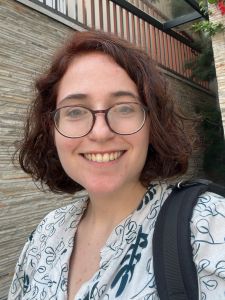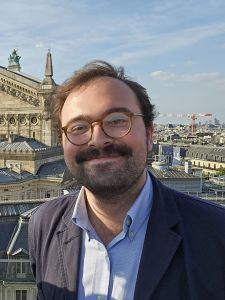The Center for the History of Political Economy at Duke University hosted its annual Summer Institute following our research workshop format on June 24-27, 2025. We invited scholars (doctoral students and those with recently awarded PhDs) to apply.
The goal of the Summer Institute was allow young scholars working in the history of economics (broadly defined) to improve their manuscripts and to receive practice in presenting their work. Successful applicants participated in multiple sessions each day, each lasting 1 hour and 15 minutes. In each session participants had 20 minutes to present their paper, followed by group discussion on ways to improve both the substance of the paper and its presentation. Sessions took place on Wednesday and Thursday. Participants departed the morning of Friday June 27th to allow those who wished to attend the History of Economics Society meeting in Richmond, Virginia, which took place from June 27-30
The papers presented were as follows:
- Julia Fleider Marchevsky, "From Miracles to Finances: Political Arithmetic, risk assessments, and insurance companies in Pre-Revolutionary France (1784-1789)."
- Mihai B. Olteanu, "Cutting the Gordian Knot: Extinguishing Public Debt in the First French Republic."
- Carlos Alberto Rivera Carreño, “A Republic of Producers: Courcelle-Seneuil’s Industrialist Foundations of Liberal Democracy.”
- Francisco A. Borja, "Ideas Across the Channel: Rethinking the French and British Schools with AI."
- Manuel Fernando Pérez Archila, "The Open Economy and Financial Crises in Latin America: The Lives and Afterlives of Carlos F. Diaz-Alejandro."
- John Paul Belk, "Governor Romero Barceló, US Public Intellectuals, and Early Neoliberalization in Puerto Rico in the 1970s"
- Bill Tulloh, "Lachmann on Max Weber: Variations on Hayekian Themes."
- Cédric Philadelphe Divry, "A City of Two Tales: New goods and knowledge spillovers in Robert Lucas' (1988) interpretation of Jane Jacobs' The Economy of Cities (1969)."
The HOPE Center thanks everyone involved for making the Summer Institute a big success.
Eligibility
The Summer Institute programs are designed primarily for PhD graduate students in economics programs in North America. However, applications from students and scholars from other fields and from overseas will be welcomed.
The Institute's faculty will assess applications with regard to:
- Academic and professional accomplishments of the candidate.
- Quality of paper draft and or paper proposal.
Application deadline and requirements:
Application Deadline: March 16 ,2025
Requirements:
Applicants should submit items 1. and 2. compiled as a single PDF.
1. Curriculum Vitae or brief biography not exceeding four pages.
2. A paper proposal outlining the content of the expected paper or a draft of the paper to be presented during the Summer Institute. A copy of the final paper should be submitted prior to the Summer Institute by June 13, 2025. This will allow all participants to read everyone's papers.
Applicants should submit their materials via Strongbox. Label your document packet with your last name and the year (e.g. Smith 2025). After submitting, notify us by emailing chope@econ.duke.edu.
If you do not receive an acknowledgment of your application within one to two days, please email us to confirm that we have received your submission.
Successful applicants will be notified of their selection in late March and should respond within a week by accepting or declining the offer.
2025 Summer Institute
June 24-27
Tuesday, June 24
(All times U.S. Eastern Day Light Time)
3:00 pm- Check into AC Marriot, Durham
6:00 pm - Meet in the Lobby of AC Marriott, Durham
6:30 pm - Welcome Barbecue Dinner, Center for the History of Political Economy, Social Sciences Building
Wednesday, June 25
(All Sessions in Room 327, Social Sciences)
9:00 - 9:20 - Welcome and Introductions
9:20 - 10:30 - Session - Tim Seida, "Just Wages and Theories of the Firm"
10:30 - 10:40 - Break
10:40 - 11:50 - Session II - Julia Fleider Marchevsky, "From Miracles to Finances: Political Arithmetic, risk assessments, and insurance companies in Pre-Revolutionary France (1784-1789)"
11:50 - 1:00 - Lunch
1:00 - 2:10 - Session III - Mihai B. Olteanu, "Cutting the Gordian Knot: Extinguishing Public Debt in the First French Republic"
2:10 - 2:20 - Break
2:20 - 3:30 - Session IV - Carlos Alberto Rivera Carreño, “A Republic of Producers: Courcelle-Seneuil’s Industrialist Foundations of Liberal Democracy.”
3:30 - 3:40 - Break
3:40 - 4:50 - Session V - Francisco A. Borja, "Ideas Across the Channel: Rethinking the French and British Schools with AI"
4:50 - 6:00 - Reception in the HOPE Center
Thursday, June 26
(All Sessions in Room 327, Social Sciences)
9:00 - 9:20 - Welcome and Introductions
9:20 - 10:30 - Session I - Manuel Fernando Pérez Archila, "The Open Economy and Financial Crises in Latin America: The Lives and Afterlives of Carlos F. Diaz-Alejandro"
10:30 - 10:40 - Break
10:40 - 11:50 - Session II - John Paul Belk, "Governor Romero Barceló, US Public Intellectuals, and Early Neoliberalization in Puerto Rico in the 1970s"
11:50 - 1:00 - Lunch
1:00 - 2:10 - Session III - Bill Tulloh, "Lachmann on Max Weber: Variations on Hayekian Themes"
2:10 - 2:20 - Break
2:20 - 3:30 - Session IV - Cédric Philadelphe Divry, "A City of Two Tales: New goods and knowledge spillovers in Robert Lucas' (1988) interpretation of Jane Jacobs' The Economy of Cities (1969)"
3:30 - 3:40 - Break
4:00 - 4:45 - Tour of the Economists' Paper Archives, Rubenstein Library
4:50 - 6:00 - Reception in the HOPE Center
Friday, June 27
12:00 noon Participants depart AC Marriot
Bruce Caldwell is a Research Professor of Economics and the Director of the Center for the History of Political Economy at Duke University. He is the author of Beyond Positivism: Economic Methodology in the 20th Century (1982), of Hayek's Challenge: An Intellectual Biography of F. A. Hayek (2004), and with Hansjoerg Klausinger, of Hayek: A Life 1899-1950 (2022). Since 2002 he has been the General Editor of The Collected Works of F. A. Hayek, a multi-volume collection of Hayek’s writings whose final volume appeared in 2022. A past president of the History of Economics Society and of the Southern Economic Association, when he's not working on Hayek, he doesn't know what to do, but sometimes he fills his time with tennis and golf.
Beatrice Cherrier is a historian of Economics at the Centre National de la Recherche Scientifique (CNRS), affiliated with CREST and Ecole Polytechnique, France. She researches the history of the applied turn in economics from the 1970s onwards. This has led her to investigate the development of economics in engineering-oriented universities such as MIT and Stanford, the status of women in the economics profession, the uses of models in policy spheres, in particular central banks, how economists model the future through discounting, and the epistemologies and computational practices developed in specific subfields (urban economics, public economics, macroeconomics).
Spencer Banzhaf is a professor in the department of agricultural and resource economics at North Carolina State University and the director of the Center for Environmental and Resource Economic Policy (CEnREP). His research interests span applied microeconomics and the history of economics. He is the author of Pricing the Priceless: A History of Environmental Economics (Cambridge U Press, 2023) and numerous journal articles. He is also the editor of the Review of Environmental Economics and Policy.
Steve G. Medema is the George Family Research Professor in the Department of Economics at Duke University and the Associate Director of the Center for the History of Political Economy. He is the author of The Hesitant Hand: Taming Self-Interest in the History of Economic Ideas (Princeton, 2009), Economics and the Law: From Posner to Post Modernism and Beyond (Princeton, 2006), and The Economics Book: From Xenophon to Cryptocurrency, 250 Milestones in the History of Economics (Sterling, 2019). He currently serves as the general editor of the Oxford Studies in the History of Economics book series, published by Oxford University Press, and was editor of the Journal of the History of Economic Thought from 1999 to 2008. Dr. Medema's current research project explores the history of the use of the Coase theorem in economics, law, and beyond.
Manuel F. Perez Archila is a PhD candidate in economics at Princeton University, where he is affiliated with the International Economics Section, the Macroeconomics Research Program and the Program in Latin American Studies. His main area of research lies at the intersections of macroeconomics, international finance, and trade. He has previously worked at the IMF and is particularly interested in the history of the international financial system. In addition to his dissertation on international macrofinance, he is writing about the history of economic thought around financial crises in Latin America through the figure of Carlos Diaz-Alejandro.
John Paul Belk recently submitted his PhD thesis in Politics at Goldsmiths, University of London. His work focuses on the political economy and economic history of neoliberal transitions in Latin America and the Caribbean, with particular attention to their entanglement with colonial legacies, Gramscian theory, and U.S. influence in the region. His thesis and broader scholarly work have especially focused on Puerto Rico’s economic history in relation to these themes. He has taught courses in comparative public policy at King’s College London and currently contributes to research and public policy initiatives in Puerto Rico.
Francisco A. Borja is a PhD candidate in Economics at Universidad Pablo de Olavide, currently serving as an Assistant Professor at Universidad San Francisco de Quito. His research investigates monetary theory, financial crises, and the historical influence of the French Liberal School on economic thought in Latin America. Francisco's dissertation employs advanced text-mining and NLP techniques to uncover the intellectual connections between French and British economic traditions, exploring how these ideas shaped economic education and policy debates in 19th-century Andean America. Francisco holds an MA in Economics from Universidad Francisco Marroquin and a BA in Psychology (Neuroscience) from the State University of New York at Stony Brook.
Carlos Alberto Rivera Carreño is a Ph.D. candidate in Economics at Université Lumière Lyon 2 (France). His research lies at the intersection of social history and the history of economic thought, with a focus on 19th-century French economist Jean-Gustave Courcelle-Seneuil. His dissertation explores how Courcelle-Seneuil’s republican commitments informed his economic thinking, particularly his effort to reconcile moral virtue with laissez-faire political economy. His current work examines the relationship between Courcelle-Seneuil’s views on entrepreneurship and workers’ cooperatives and his experience managing a metallurgical factory in Limoges. Carlos holds a B.A. in International Studies and Financial Engineering from Korea University (South Korea) and an M.A. in Economics and Social Sciences from Université Paris 1 Panthéon-Sorbonne (France).
Cédric Philadelphe Divry recently obtained his PhD in economics from Université Paris 1 Panthéon-Sorbonne. His research centers around the role of cities in theories of economic growth, particularly in the economic thought of Jane Jacobs (1916-2006) and endogenous growth theory. He is currently a substitute lecturer in the History of Economic Thought at the University of Geneva.
Julia Fleider Marchevsky is currently a postdoc at Universidade Estadual de Campinas, where she studies the economic thinking of anti-bullionists in early 19th-century Britain. She has recently concluded her PhD at Universidade Federal de Minas Gerais and Université Paris 8. Her thesis focused on the financial debates in France during the crisis of the Old Regime between 1764 and 1790. Overall, her main interests are the history of monetary and financial ideas, especially regarding the coupling of national currencies with the public debts of their countries.
Mihai Olteanu is a PhD candidate in history at Johns Hopkins University. His research focuses on the economic and intellectual history of the French Revolution. His dissertation explores changes in political economic thought and practice after Thermidor and during the Directory. In addition to research on debt and fiscal politics, the project explores the relationship between republican, liberal, and mercantile political economy during the revolutionary process. Mihai holds a BA in History and the College of Social Studies from Wesleyan University and an MA in Social Sciences from the University of Chicago.
Tim Seida is a Ph.D. candidate in Northwestern University’s financial economics program, a joint degree offered through the Finance Department at the Kellogg School of Management and the Economics Department at the Weinberg College of Arts and Sciences. His research analyzes financial intermediation, household finance, mortgage markets, and unconventional monetary policy. Tim has a long-standing interest in the history of economic thought. He received a B.A. in financial economics from the University of Notre Dame, and before beginning the Northwestern Ph.D. program worked as a Research Assistant in the Finance group at the Federal Reserve Bank of Chicago.
Bill Tulloh is a Ph.D. candidate in economics at RMIT University in Melbourne, Australia. His research interests include Austrian economics, complexity theory, history of economic thought, and market design. He has a particular interest in the intersection of markets and computation. Bill's thesis explores the role of abstraction in Hayek's theory of the extended order, especially how abstract institutions enable adaptation to the unknown. He is also working on an intellectual biography of Hayek’s student, Ludwig Lachmann.
Venue
- Lodging and breakfast will be provided by the Center at the AC Hotel Durham
- Sessions will be held in 113 Social Sciences Building; 419 Chapel Drive, Durham NC 27708
Travel
- Duke University is located near downtown Durham. View Larger Map
- RDU International Airport is located about 20 miles from campus. Taxi and Uber services are recommended for travel to and from the airport. A taxi from the airport to campus will cost around $50.
- The campus buses operate on a limited schedule during the summer. More information on transportation can be found at Duke University Transportation Services.
Weather
- June in North Carolina can range from 60 degrees in the evenings to 90 during the day.
Dining
- The Brodhead Center in the West Union Building contains several restaurants, but they may have limited hours during the summer.
- For complete details of dining on campus, visit Duke Dining.
- A wide variety of cuisines are available in Durham. There are some great restaurants and bars on Ninth Street and along Main Street downtown. These two streets are easily accessible from East Campus, which is accessible by campus bus from West Campus.
Library Hours
- See here.
Health
- In the event of a life-threatening emergency, participants should go directly to the Emergency Department (684-2413). If necessary, Duke Police (911 or 684-2444) will provide on-campus transportation to the Emergency Department.
Banking
- There are ATMs on the bottom floor of the Bryan Center.
Durham Events/Info
- For a calendar of events and information on things to do in the area, go here.
For help with additional details or questions please email chope@econ.duke.edu.





